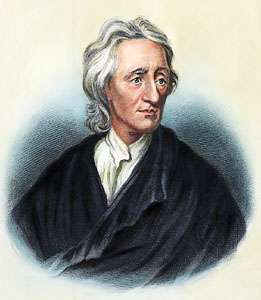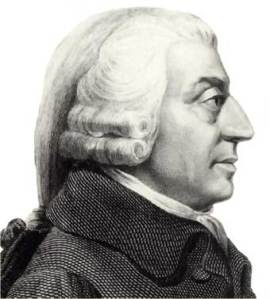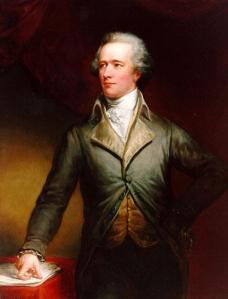 In Part 1, I described an essential premise found in the Declaration of Independence that makes it the most important human rights document in American history. Liberty is the right to protect the God-given rights possessed by human beings and to protect those rights by force if necessary from anyone using arbitrary power to strip them of their liberties.
In Part 1, I described an essential premise found in the Declaration of Independence that makes it the most important human rights document in American history. Liberty is the right to protect the God-given rights possessed by human beings and to protect those rights by force if necessary from anyone using arbitrary power to strip them of their liberties.
The idea is no small matter. One of the goals of those who exercise arbitrary power is the subjugation of anyone who present a threat. Although this viewpoint is frequently criticized as cynical or even paranoid, history teaches something different. Robert A. Heinlein, the visionary master of science fiction in the 20th century, addresses this issue in Starship Troopers, a book that is really about the nature and responsibilities of citizenship. In one section of the novel, a teacher of a course called “History and Moral Philosophy” (a course required for high school graduation in the fictional world of the 23rd century) refutes the idea that “violence never settles anything.”
Anyone who clings to the historically untrue – and thoroughly immoral – doctrine ‘that violence never settles anything’ I would advise to conjure up the ghosts of Napoleon Bonaparte and of the Duke of Wellington and let them debate it. The ghost of Hitler could referee, and the jury might well be the Dodo, the Great Auk and the Passenger Pigeon. Violence, naked force, has settled more issues in history than has any other factor, and the contrary opinion is wishful thinking at its worst. Breeds that forget this basic truth have always paid for it with their lives and freedom.
Those who are the enemies of freedom are often those quite comfortable with the use of force, even violence to achieve their ends. It all depends on whether a society is willing to acknowledge that reality. Fortunately, the authors of the Declaration had no delusions regarding the link between “liberty,” “life,” and another closely related idea “the pursuit of happiness.”
 Life is a basic right, John Locke wrote, because all are equal under the law of nature, created equally by nature’s God, and independent of subordination – therefore, no one can arbitrarily take another’s life unless it is deprived in the cause of justice. Simply taking life for no just cause not only kills the body, but declares the subordination of the victim, denying the people their equal rights. According to Locke:
Life is a basic right, John Locke wrote, because all are equal under the law of nature, created equally by nature’s God, and independent of subordination – therefore, no one can arbitrarily take another’s life unless it is deprived in the cause of justice. Simply taking life for no just cause not only kills the body, but declares the subordination of the victim, denying the people their equal rights. According to Locke:
“The state of nature has a law of nature to govern it, which obliges every one: and reason, which is that law, teaches all mankind, who will but consult it, that being all equal and independent, no one ought to harm another in his life, health, liberty, or possessions: for men being all the workmanship of one omnipotent, and infinitely wise maker; all the servants of one sovereign master, sent into the world by his order, and about his business; they are his property, whose workmanship they are, made to last during his, not one another’s pleasure: and being furnished with like faculties, sharing all in one community of nature, there cannot be supposed any such subordination among us, that may authorize us to destroy one another, as if we were made for one another’s uses, as the inferior ranks of creatures are for our’s. Every one, as he is bound to preserve himself, and not to quit his station wilfully, so by the like reason, when his own preservation comes not in competition, ought he, as much as he can, to preserve the rest of mankind, and may not, unless it be to do justice on an offender, take away, or impair the life, or what tends to the preservation of the life, the liberty, health, limb, or goods of another.”
The American Patriots could not enjoy their liberty and the pursuit of happiness if they were deprived of their lives. Furthermore, they possessed a right to protect not only their lives, but the things that allowed them to maintain their lives (their health, possessions, even the ability to use their bodies). For example, British actions ranging from control over their trade to the Boston Massacre to outright war was all arguably an attack that emphasized the British government’s goal of subordinating Americans into “inferior ranks,” impair life by impairing livelihood, and denying justice based on widely accepted belief’s in natural rights. Listing “life” as an unalienable right sets a standard that the British failed to meet by the measure applied by Jefferson and the Continental Congress.
“The pursuit of happiness” was one of the innovations of the Enlightenment. For centuries, philosophers in the Christian era saw happiness as something ultimately obtainable only in the afterlife; in the 18th century, political thinkers and economists moved it to the realm of everyday life. Many intellectuals of the age dreamed of bringing happiness, which they defined as the greatest good for the greatest number of people, to humanity as a  whole through the expansion of liberty and freedom. Adam Smith writing in The Wealth of Nations described how the pursuit of what he deemed personal economic advantage shaped the possibilities of cooperation without coercion – the stark opposite of British taxation and trade policy imposed on the North American colonies to pay the expenses of the Seven Years’ War – through an “invisible hand” that could promote the good of the community through the free market. “As every individual, therefore, endeavors as much he can both to employ his capital in the support of domestic industry, and so to direct that industry that its produce may be of the greatest value; every individual necessarily labors to render the annual revenue of the society as great as he can. He generally, indeed, neither intends to promote the public interest, nor knows how much he is promoting it … By pursuing his own interest he frequently promotes that of the society more effectually than when he really intends to promote it,” said Smith. Technological innovation and social improvement (what we today would sum up as “progress”) could be meted out and its effects measured with a “science of happiness,” according to the Marquis de Chastellux, one of Jefferson’s minor intellectual heroes. The French thinker even established “indices of happiness” based on levels of taxation, working hours, levels of agricultural production, and whether a society possessed slavery or faced war, all of which were impediments to the pursuit of happiness. Of course, Locke, too, had weighed in on the question of happiness, which he linked to the presence of liberty obtaining the greatest good for both individuals and society as a whole:
whole through the expansion of liberty and freedom. Adam Smith writing in The Wealth of Nations described how the pursuit of what he deemed personal economic advantage shaped the possibilities of cooperation without coercion – the stark opposite of British taxation and trade policy imposed on the North American colonies to pay the expenses of the Seven Years’ War – through an “invisible hand” that could promote the good of the community through the free market. “As every individual, therefore, endeavors as much he can both to employ his capital in the support of domestic industry, and so to direct that industry that its produce may be of the greatest value; every individual necessarily labors to render the annual revenue of the society as great as he can. He generally, indeed, neither intends to promote the public interest, nor knows how much he is promoting it … By pursuing his own interest he frequently promotes that of the society more effectually than when he really intends to promote it,” said Smith. Technological innovation and social improvement (what we today would sum up as “progress”) could be meted out and its effects measured with a “science of happiness,” according to the Marquis de Chastellux, one of Jefferson’s minor intellectual heroes. The French thinker even established “indices of happiness” based on levels of taxation, working hours, levels of agricultural production, and whether a society possessed slavery or faced war, all of which were impediments to the pursuit of happiness. Of course, Locke, too, had weighed in on the question of happiness, which he linked to the presence of liberty obtaining the greatest good for both individuals and society as a whole:
As therefore the highest perfection of intellectual nature lies in a careful and constant pursuit of true and solid happiness, so the care of ourselves, that we mistake not imaginary for real happiness, is the necessary foundation of our liberty. The stronger ties we have to an unalterable pursuit of happiness in general, which is our greatest good, and which, as such, our desires always follow, the more are we free from any necessary determination of our will to any particular action, and from a necessary compliance with our desire, set upon any particular, and then appearing preferable good, till we have duly examined, whether it has a tendency to, or be inconsistent with our real happiness: and therefore till we are as much informed upon this inquiry, as the weight of the matter, and the nature of the case demands; we are, by the necessity of preferring and pursuing true happiness as our greatest good, obliged to suspend the satisfaction of our desires in particular cases.
As far as Jefferson was concerned, the British government deliberately thwarted the Americans’ pursuit of happiness by placing the thirteen colonies in a state of war, taxed them without representation, and (some today might argue improbably) encouraged the colonial slave trade as Jefferson argued in the Rough Draught. It is worth noting that Jefferson had developed many of these ideas two years earlier in a pamphlet that sealed his reputation as a stylist and even a radical. Jefferson had penned A Summary View of the Rights of British North America as policy paper when illness prevented his attendance at a convention of Virginia’s burgesses who were drafting a response of solidarity with Massachusetts after Parliament imposed the Boston Port Act. The Englishmen who had emigrated to the American colonies did so as free men with the highest hopes to improve their lot, paying for the enterprise with lives and treasure. “America was conquered, and her settlement made, and firmly established, at the expense of individuals, and not of the British public. Their own blood was spilt in acquiring lands for their settlements, their own fortunes expended in making that settlement effectual; for themselves they fought, for themselves they conquered, and for themselves alone they have right to hold.” With a lawyer’s precision, Jefferson pointed out how “his majesty has no right to land a single armed man on our shores,” how British policy had resulted in unfair taxes and stifling regulations that prevented Americans from enjoying the fruits of their own labors (“Men who had spent their lives in extending the British commerce, who had invested in that place the wealth their honest endeavors had merited, found themselves and their families thrown at once on the world for subsistence by its charities …This is administering justice with a heavy hand indeed!”). Jefferson in the Summary View complained about the closure of Boston Harbor and British opposition to colonial efforts at banning the slave trade (“…Our repeated attempts to effect this by prohibitions, and by imposing duties which might amount to a prohibition, have been hitherto defeated by his majesty’s negative: Thus preferring the immediate advantages of a few African corsairs to the lasting interests of the American states, and to the rights of human nature deeply wounded by this infamous practice.”) Jefferson’s arguments in the Summary View were hardly mainstream, but they are earlier evidence of his political thinking that Americans had the right to decide their own futures in a way that would best suit their search for political and economic opportunities, the “pursuit of happiness” he later described in the Declaration.
Finally, the Declaration makes a strong statement regarding the necessity of republican government and the right to seek change if a current form of government attempts to destroy the blessing of those rights. In the natural rights statement of the Declaration, Jefferson made it clear that the people can have any form of government they choose. However, it is abundantly evident that he and the other Founders wanted America to have a republican form of government based on the consent of the community of the political involved and firmly rooted in representation of the people’s interests. Jefferson stated that government is strongest when every man feels himself a part. The people secured these rights – government did not grant them – and a just government exercising just powers is derivative of the people and their will. No other form of government would have been “an expression of the American mind” in Jefferson’s words, and since government was to his mind a man-made device for promoting human welfare, guaranteeing self-government was the right and the duty of the American Revolution, not simply of Englishmen. It would provide the best form of government, meeting the expectations of Americans who in 1776 were obviously willing to defend their right to self-government and providing a road map for what a stable and responsible future government of the United States would be. Linking the need to self-government to a call for independence made sense as well, since Jefferson would soon argue in the next section of the Declaration that history showed Great Britain had abandoned its practice of allowing the colonies their own form of just government. As Jefferson makes the case that “a long train of abuses and usurpations, pursuing invariably the same Object evinces a design to reduce them under absolute Despotism,” it is worth remembering Alexander Hamilton later stated in Federalist No. 9 a  political philosophy regarded as a self-evident truth by the founding generation: Republican forms of government would help Americans avoid “the perpetual vibration between the extremes of tyranny and anarchy.” According to Jefferson, securing that form of government would only come as the result of the successful establishment of the United States of America and the rejection of Great Britain.
political philosophy regarded as a self-evident truth by the founding generation: Republican forms of government would help Americans avoid “the perpetual vibration between the extremes of tyranny and anarchy.” According to Jefferson, securing that form of government would only come as the result of the successful establishment of the United States of America and the rejection of Great Britain.
A republican form of government. Limits on governmental power. The recognition that ordinary people know more about their own pursuit of happiness than those in power. These are the ideas worth fighting for, as declared in the Declaration of Independence. They are venerable ideas deeply respected in America’s past. Do these ideas matter today? Or is even the discussion of these ideas found in the Declaration the mark of those oriented toward violence and social upheaval rather than liberty? More about those questions in Part 3.
Next: Why liberty is worth fighting for, and what “fighting for” means.




Is Adam Smith’s “Invisible Hand” Misunderstood? A Declaration
Perhaps. None other than Milton Friedman had a clear understanding of the phrase, which he examined in detail during his monumental television series Free to Choose and in the accompanying book written in conjunction with his wife Rose. Smith, Friedman wrote, argued that government had its uses (blocking monopolies, for example) but it was the poorest stimulant for economic growth. (Take the time to watch this clip from Episode 1, “The Power of the Market,” where Friedman brilliantly uses a simple pencil to describe the invisible hand as a force for peace and cooperation. You will understand why he won the Noble Prize in Economics.)
Where Rollert hits the mark (I could care less about his politicking in the article) is correctly pointing out that Smith’s seminal work The Wealth of Nations includes a withering blast against mercantilism, the prevalent national economic policy of Britain which regulated the economy of the American colonies. Smith’s book is published the same year as the Declaration of Independence and there is superb evidence that many of the delegates to the Second Continental Congress were familiar with his ideas. Jefferson and Smith would have been agreement when discussing the economic charges leveled at George III specifically and the British government generally in the Declaration:
The condemnation of taxation without representation is one that every school child should know. What often goes unsaid or unknown are the economic arguments in the Declaration that make clear that “life, liberty, and the pursuit of happiness” should be free from the unwarranted regulation of government that does not enjoy broad consent of the people. If the people wish to alter or abolish that form of government it can be for economic reasons as much as for political reasons.
I often wonder if either President Obama or Gov. Romney would sign the Declaration if they truly understood what it meant. If both would read it and The Wealth of Nations they would understand that the United States should not measure its wealth by how government imposes a visible hand of “fairness” but how it promotes cooperation between free individuals who use the power of the market to improve their lives.
Leave a comment
Filed under Commentary, History of the Declaration of Independence
Tagged as "The Wealth of Nations", 2012 Election, Adam Smith, Declaration of Independence, John Paul Rollert, mercantilism, Thomas Jefferson